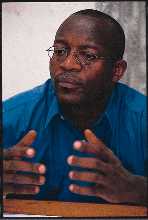
PROFILE:
A Native Son Comes Home to Help
Jon Cohen*
Photos by Malcolm Linton
NAIROBI, KENYA--In December 1996, when Omu Anzala returned to Kenya after completing his Ph.D. work in Canada on HIV's interactions with the immune system, his older brother was part of the family contingent that welcomed him home. "Just looking at him at the airport told me that all was not well," remembers Anzala. "They never told me." Four months later, his brother, then 37, died from AIDS.
Anzala, now a University of Nairobi researcher who runs the Kenyan end of one of the most advanced AIDS vaccine projects in Africa, takes a long look at the tabletop in his sparsely decorated office. "With all this knowledge I'd learned, I couldn't do anything," says Anzala. "I tried to get all the antiretrovirals, but it was late. It told me why I am even studying this. So AIDS is close to me. Very, very close. That really makes me push for vaccines, because that's where we'll save the majority of Kenyans and the majority of people."
Since 1987, Anzala has worked with a collaborative AIDS research project started by researchers from his university and the University of Manitoba. "If there's anyone who has benefited from this collaboration, that would be me," he says. The collaboration helped him earn his Ph.D. in Canada, which in turn led to postdoctoral work at Oxford University with one of the world's leading HIV immunologists, Andrew McMichael. Now the International AIDS Vaccine Initiative has funded Anzala, McMichael, and two European companies to fashion an AIDS vaccine based on a strain of HIV circulating in Kenya.
Kelly MacDonald, a veteran of the collaboration who studied with Anzala in Canada and now directs the University of Toronto's HIV research program, says Anzala represents "the new breed of African scientists" who are trained abroad but working at home with real opportunities. "There's a shortage of people like Anzala in Kenya and elsewhere in Africa," says MacDonald.

Test shot. Omu Anzala pins his hopes on a vaccine.
Anzala emphasizes that he has had to chart his own course. He says, for example, that he was encouraged to study epidemiology rather than virology for his Ph.D. "The Canadians told me that's what Africa needs," says Anzala. "No. We've been counting numbers for a long time. You want me to keep counting numbers? For how long?" Anzala replied. He also had to convince his Oxford collaborators that the Nairobi lab, if properly equipped, could do sophisticated analyses of blood samples for the vaccine trial. "They wanted us to ship things," says Anzala. "The whole issue has been, 'Oh you don't have support, you can't order reagents.' " He eventually prevailed. "We can do much more than be a collection point for other labs," asserts Anzala.
If all goes well, trials of the Kenyan vaccine--which is designed to boost the body's so-called killer T cell defenses--will begin in Nairobi by December. Anzala stresses how badly his country needs this weapon. "The answer to HIV and AIDS infection in Kenya is not going to be condoms and education," he says. "We've been telling people that for 15 years. What is happening? We're still seeing more infections. What we really need is the same thing that prevents measles and has almost eradicated polio."
* Jon Cohen was accompanied by photographer Malcolm Linton. For a gallery of additional photos and the stories behind them, see
www.sciencemag.org/feature/data/aids_africa/gallery.shl.
Volume 288,
Number 5474,
Issue of 23 Jun 2000,
p. 2166.
Copyright © 2000 by The American Association for the Advancement of Science.
|